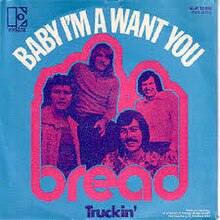
"I Can't Get Next to You" is a 1969 No. 1 single recorded by the Temptations and written by Norman Whitfield and Barrett Strong for the Gordy (Motown) label. The song was a No. 1 single on the Billboard Top Pop Singles chart for two weeks in 1969, from October 18 to October 25, replacing "Sugar, Sugar" by the Archies and replaced by "Suspicious Minds" by Elvis Presley. The single was also a No. 1 hit on the Billboard Top R&B Singles for five weeks, from October 4 to November 1, replacing "Oh, What a Night" by the Dells, and replaced by another Motown song, "Baby I'm For Real" by the Originals.
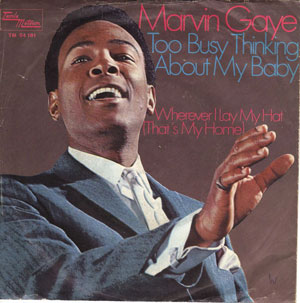
"Too Busy Thinking About My Baby" is a Motown song written by Norman Whitfield, Barrett Strong, and Janie Bradford. The song was first recorded by The Temptations as a track on their 1966 album Gettin' Ready. Eddie Kendricks sings lead on the recording, which was produced by Whitfield. Jimmy Ruffin also recorded a version with The Temptations providing background vocals in 1966. It remained unreleased until 1997.

"Black and White" is a song written in 1954 by David I. Arkin and Earl Robinson (music). It was first recorded by Pete Seeger featuring an African-American child, in 1956 from the album Love Songs for Friends & Foes.

"Breaking Up Is Hard to Do" is a song recorded by Neil Sedaka, co-written by Sedaka and Howard Greenfield. Sedaka recorded this song twice, in 1962 and 1975, in two significantly different arrangements, and it is considered to be his signature song. Between 1970 and 1975, it was a top-40 hit three separate times for three separate artists: Lenny Welch, The Partridge Family and Sedaka's second version.

"Yes, I'm Ready" is a song by Barbara Mason from her album Yes, I'm Ready (1965). It has been covered by numerous artists, and was a hit single for Teri DeSario and K.C. when they recorded a duet version in 1980.
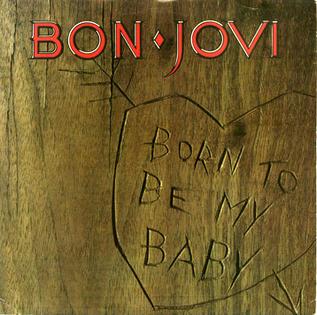
"Born to Be My Baby" is a song by American rock band Bon Jovi. It was written by Jon Bon Jovi, Richie Sambora, and Desmond Child. It was released on November 24, 1988 as the second single from their fourth studio album New Jersey. It peaked the following year at number 2 on the Cash BoxTop 100, 3 on the Billboard Hot 100, number 7 on the Mainstream Rock Tracks chart, number 22 in the UK, and number 30 in Australia.

"Baby, What a Big Surprise" is a ballad written by Chicago's then bassist/singer Peter Cetera, which appeared on their album Chicago XI (1977), with Cetera singing lead vocals. The first single released from the album reached number 4 on the US Billboard Hot 100 chart.
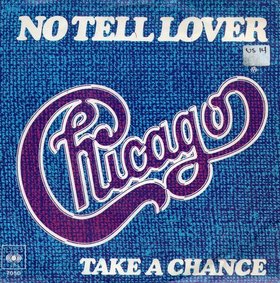
"No Tell Lover" is a song written by Lee Loughnane, Danny Seraphine, and Peter Cetera for the group Chicago and recorded for their album Hot Streets (1978), with Cetera and Donnie Dacus singing lead vocals. The second single released from that album, it reached No. 14 on the U.S. Billboard Hot 100 chart and No. 5 on the adult contemporary chart.
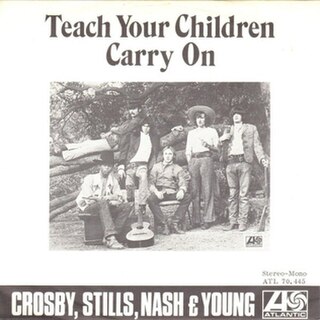
"Teach Your Children" is a song written by Graham Nash in 1968 when he was a member of the Hollies. Although it was never recorded by that group in a studio, the Hollies did record it live in 1983. After the song was initially recorded for the album Crosby, Stills & Nash in 1969, a much more enhanced version of the song was recorded for the album Déjà Vu by Crosby, Stills, Nash & Young, released in 1970. As a single, the song peaked at No. 16 on the Billboard Hot 100 charts that year. On the Easy Listening chart, it peaked at No. 28. In Canada, "Teach Your Children" reached No. 8. Reviewing the song, Cash Box commented on the "incredible soft harmony luster" and "delicately composed material." Billboard called it "a smooth country-flavored ballad that should prove an even bigger hit on the charts [than 'Woodstock']." Stephen Stills gave the song its "country swing", replacing the "Henry VIII" style of Nash's original demo.

"Still" is a 1979 song by the soul music group the Commodores. It was released as a single on Motown Records with "Such a Woman" as the B-side. The song appears on their 1979 hit album Midnight Magic. This was their last No. 1 hit in the country.

"Day After Day" is a song by the British rock band Badfinger from their 1971 album Straight Up. It was written by Pete Ham and produced by George Harrison, who also plays slide guitar on the recording. The song was issued as a single and became Badfinger's biggest hit, charting at number 4 in the United States and number 10 in the UK, ultimately earning gold accreditation from the Recording Industry Association of America.
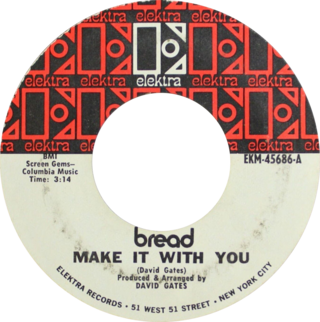
"Make It with You" is a song written by David Gates and originally recorded by American pop-rock group Bread, of which Gates was a member. Gates and drummer Mike Botts are the only members of the group to appear on the recording, which was Bread's only No.1 hit on the Billboard Hot 100 chart.

"The Guitar Man" is a song written by David Gates and originally recorded by the rock group Bread. It first appeared on Bread's 1972 album, Guitar Man. It is a mixture of the sounds of soft rock, including strings and acoustic guitar, and the addition of a wah-wah effect electric guitar, played by Larry Knechtel. It peaked at No. 11 on the Billboard Hot 100 chart in the United States and was their third No. 1 hit on the easy listening chart,.

"Crying Time" is a song from 1964 written and originally recorded by the American country music artist Buck Owens. It gained greater success in the version recorded by Ray Charles, which won two Grammy Awards in 1967. Numerous other cover versions have been performed and recorded over the intervening years.

"My Angel Baby" is a 1978 song by Toby Beau. "My Angel Baby" was written by band members Danny McKenna and Balde Silva. The single, from the group's self-titled album, went to #1 on the Easy Listening chart for one week, and peaked at #13 on the Billboard Hot 100. "My Angel Baby" was the group's only Top 40 single. In Canada, the song reached #10 on the Top 100 chart.

Love Theme from "The Godfather" is the twenty-ninth studio album by American pop singer Andy Williams, released on March 21, 1972, by Columbia Records. The two new songs on what was otherwise another LP of covers of hits by other artists were the title track and "Music from Across the Way", which came from the songwriters behind his recent hits "Happy Heart" and "(Where Do I Begin) Love Story".
"Daddy's Home" is a famous song by American doo-wop group Shep and the Limelites. The song was written by the three members of the band, James "Shep" Sheppard (1935–1970), Clarence Bassett (1936–2005) and Charles Baskerville. The group recorded the original version of "Daddy's Home" on February 1, 1961, and it was released on Hull Records in March 1961 with the B-side being "This I Know".

Walkin' in the Rain with the One I Love was an R&B single in 1972 for the soul trio Love Unlimited, a studio group created by singer/producer Barry White. The main vocalists were female singers Glodean James, her sister, Linda James, and their cousin Diane Taylor. Glodean would eventually become White's wife in 1974; the couple would split up in 1988, though they never divorced.

The singles discography of Elvis Presley began in 1954 with the release of his first commercial single, "That's All Right". Following his regional success with Sun Records, Presley was signed to RCA Victor on November 20, 1955. Presley's first single with RCA, "Heartbreak Hotel", was a worldwide hit, reaching the No. 1 position in four countries and the top 10 in many other countries. Other hit singles from the 1950s include "Don't Be Cruel", "Hound Dog", "Love Me Tender", "Too Much", "All Shook Up", "(Let Me Be Your) Teddy Bear", "Jailhouse Rock", "Don't", "Hard Headed Woman" and "A Big Hunk o' Love". On March 24, 1958, Presley entered the United States Army at Memphis, Tennessee, and was stationed in Germany. He left active duty on March 5, 1960.

Ear Candy is the ninth studio album by Australian-American pop singer Helen Reddy, released on 25 April 1977 by Capitol Records. The album included a modern take on the doo-wop genre, a Cajun number that gave the Melbourne native her first and only appearance on Billboard magazine's Country chart, and a dark self-parody on which Reddy proclaims: "I don't take no shit from nobody". Unusually, half of the songs recorded for Ear Candy were co-written by Reddy herself, including the second single: "The Happy Girls", Reddy's first self-penned A-side single since "I am Woman". The album's first single, a remake of the 1964 Cilla Black hit "You're My World", gave Reddy a final Top 40 hit.
